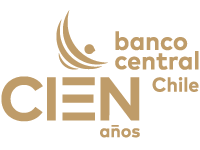Independent Evaluation Panel designated by the Central Bank finalize its process and final report
Institucionales
Friday, December 6, 2019
Independent Evaluation Panel designated by the Central Bank finalize its process and final report
The Independent Evaluation Panel convened by the Board of the Central Bank of Chile in September 2018, delivered the full report on its assessment in the conduct of monetary policy and financial policy by the Bank.
The Panel was consulted to review the Central Bank’s independence, its influence, and the impact of its policy actions, the suitability of its policy framework and the policy tools used to achieve its constitutional objectives of price and financial stability, effectiveness of its organization, procedures, and the quality of its communications.
In all these areas, the Panel was also invited to make recommendations. Of its set of 40 recommendations, 24 refer to monetary policy, 13 to financial policy, and three to corporate issues.
The full report is added to the related material published in September 2019, composed of the executive summary of the full report, the response and course of action by the Board of the Central Bank, the presentation of Governor Mario Marcel before the Finance Commission of the Senate, and previous evaluations of specific aspects of monetary and financial policy. All this material is available on the website.
In January 2019, the Panel held an initial meeting with the Central Bank team. In March 2019, the Panel met separately with the Board, staff, teams, former authorities and officials of the Central Bank, with members of other regulatory institutions, including the Commission for the Financial Markets (CMF) and the Ministry of Finance, and academics and economists of local investment banks. In July 2019, the Panel discussed the draft report with Central Bank staff. Also, and to obtain first-hand information and a realistic experience, the Panel attended preparatory meetings of the Monetary Policy Report of March 2019, as well as the Monetary Policy Meeting of July 18, 2019.
The Panel was made up of five economists with outstanding experience in central banking, macroeconomics and financial markets:
Karnit Flug. Chair of the Panel. Governor of the Bank of Israel from November 2013 to November 2018, and previously its Deputy Governor since 2011. In 1984, she worked with the IMF, and in 1988 she joined the Research Department of the Bank of Israel. In 1997 she was appointed Assistant Director and in 2001 Director of the same Research Department. Throughout her career, she has authored and published numerous academic articles on central banking and monetary policy, fiscal policy, the labor market and international finance.
Guillermo Calvo. Professor of Economics at the School of International Affairs of Columbia University, US. Past experience includes serving as Senior Advisor to the Research Department of the International Monetary Fund (1988-1993), Chief Economist of the Inter-American Development Bank (2001-2006), and Distinguished Professor of the Department of Economics at the University of Maryland, US (1994-2006). His research has focused on economic theory, especially topics of prices and inflation, central banking and public finances and, more recently, on capital flows and balance of payments crises in emerging economies.
Petra Geraats. Professor at the School of Economics, University of Cambridge, UK. She has served as Advisor to the IMF’s Independent Evaluation Office, as External Expert of the Central Banking Studies Group, of the Economics and Monetary Department of the Bank for International Settlements and has been a member of independent evaluation panels of the European Central Bank and the Central Bank of Norway. She has done research in macroeconomics, international finance and behavioral economics, with special emphasis on monetary policy transparency.
Donald Kohn. Senior Researcher of the Economic Studies program of the Brookings Institution, US. He is currently an external member of the Bank of England Financial Policy Committee. Previously, he served for 40 years in the US Federal Reserve Board, including being its Deputy Governor between 2002 and 2010. He advised Federal Reserve Governor Ben Bernanke during the years 2008 and 2009 and previously then Governor Alan Greenspan, among other duties within the Federal Reserve. His research has focused mainly on central banks’ communication and independence, implementation of monetary policy and financial regulation and supervision.
Enrique Mendoza. Presidential Professor of Economics and Director of the Penn Institute for Economic Research, University of Pennsylvania, US. Previous engagements include being Professor of Economics at the University of Maryland, US, Associate Professor at Duke University, North Carolina, US, and economist at the IMF and the US Federal Reserve. His research focuses on international capital flows, financial crises, sovereign debt, and international business cycles.
